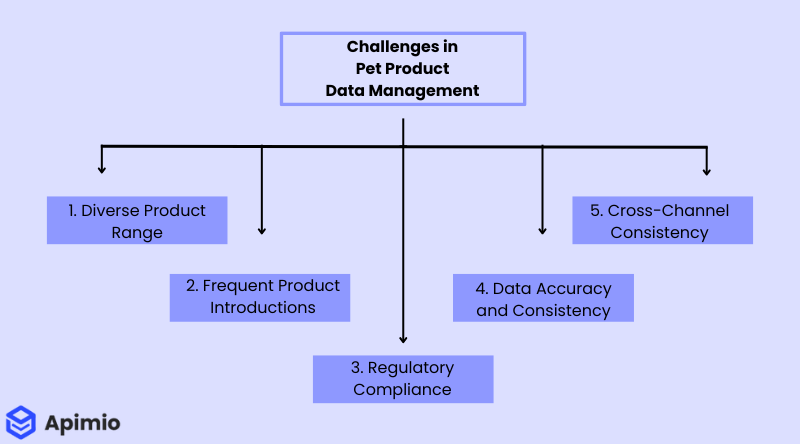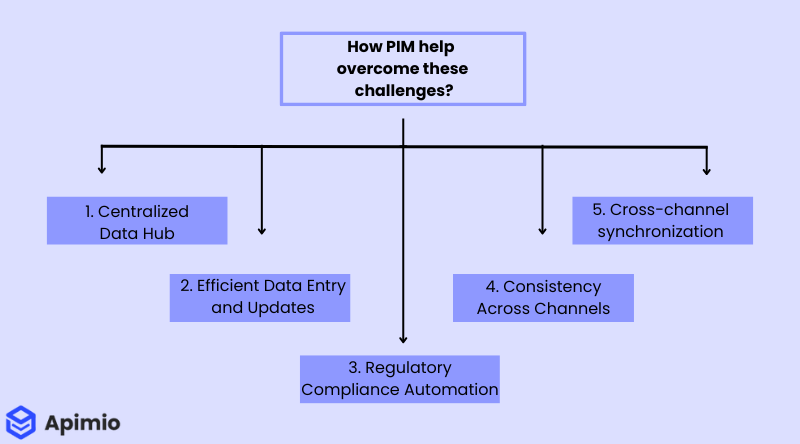Try Apimio for free and explore how our customizable PIM solution can be tailored to your unique pet industry requirements.
Key Takeaways
- PIM system is important for efficiently managing diverse product data in the pet industry.
- PIM provides pet-specific features, including detailed categorization and global market adaptability.
- Implementing PIM strategically boosts efficiency, satisfaction, and overall pet business growth.
- Choosing the right PIM involves considering scalability, integration, and customization, ensuring alignment with specific business needs.
Imagine it’s a super busy Monday morning at your online pet store. Your inbox is overflowing with requests to update pet product data, add new items, and make sure everything follows the latest rules.
It feels like you’re racing against time and dealing with loads of information. But guess what? Using PIM for pet industry can help you overcome these challenges.
Role of Product Data in the Pet Industry
Product data is like a helpful guide making things easier for both pet owners and pet businesses.
Product data for Pet Owners
Think about when you’re shopping online for pet supplies, and you want to pick the best food for your furry friend.
Product data, which includes details like what’s in the food and how much to give, helps you choose the right one for your pet’s needs.
Product data for Pet Businesses
Flip the scenario to a pet store manager handling all the products. Imagine they need to know which pet toys are running low so they can restock.
Accurate product data keeps everything organized, preventing shelves from being too full or too empty.
It’s like a smooth-running machine, ensuring pet products are available when customers want them.
Transform your product information workflow with Apimio
Try our PIM solution free to revolutionize your business operations with ease and precision.
Challenges in Pet Product Data Management
Managing product data in the pet industry comes with its own set of challenges.
Here are some common hurdles faced in pet product data management:

1. Diverse Product Range
The pet industry is incredibly diverse, offering a wide range of products from pet food and toys to grooming supplies and accessories.
Managing information for such a varied inventory can be challenging, requiring careful attention to detail for each product category.
2. Frequent Product Introductions
With ongoing innovations and trends in the pet industry, there’s a constant influx of new products.
Keeping up with the introduction of these items and ensuring accurate and up-to-date information poses a challenge for businesses in terms of data entry and maintenance.
3. Regulatory Compliance
The pet industry is subject to regulations and standards to ensure the safety and well-being of pets.
Ensuring that product data complies with these regulations, including accurate labeling and safety guidelines, can be a complex task, especially as regulations evolve.
4. Data Accuracy and Consistency
Maintaining accurate and consistent data across various platforms, both online and offline, is a persistent challenge.
Inaccurate or inconsistent data can lead to customer confusion, negatively impacting the shopping experience and potentially causing compliance issues.
5. Cross-Channel Consistency
Pet businesses often operate across multiple channels, including physical stores, online platforms, and mobile applications.
Ensuring consistency in product data across these different channels is crucial for a seamless customer experience but can be challenging to achieve.
How PIM help overcome these challenges?
Ecommerce managers need tools and systems that not only help them navigate these complexities but also turn them into opportunities for growth and customer satisfaction.
The PIM system helps overcome the challenges associated with managing product data in the pet industry.

Here’s how PIM helps address these hurdles;
1. Centralized Data Hub
PIM acts as a centralized hub for all product information, consolidating data from various sources and vendors.
This centralization streamlines the management of diverse product ranges, providing a unified platform to organize and update information efficiently.
2. Efficient Data Entry and Updates
PIM systems offer user-friendly interfaces for data entry and updates.
With intuitive tools, businesses can swiftly add new products, edit existing data, and ensure that all information remains accurate and up-to-date, even in the face of frequent product introductions.
3. Regulatory Compliance Automation
PIM systems can automate compliance checks by incorporating regulatory standards into the data management process.
This ensures that product data consistently meets industry regulations, minimizing the risk of non-compliance and supporting the safety and well-being of pets.
4. Consistency Across Channels
PIM helps maintain consistency across various sales channels, be it in-store, online, or mobile platforms.
By managing product data in a unified manner, businesses can present accurate and uniform information to customers, fostering a seamless and reliable shopping experience.
5. Cross-channel synchronization
PIM ensures synchronization of data across multiple channels, preventing disparities in product information.
Whether a customer is browsing products in a physical store or online, PIM guarantees a consistent presentation, reinforcing customer trust and brand reliability.
Key Features of a PIM System Customized for the Pet Industry
A PIM system tailored for the pet industry is not just a generic data management tool; it’s a specialized solution designed to meet the unique needs of this industry.
Let’s explore these key features that make PIM systems essential for managing pet products, highlighting their practical applications;
| Key Features | Tailored Feature | Application |
| Product Categorization | Advanced classification based on pet-specific attributes. | Easier customer searches, e.g., ‘Dog Food > Small Breeds.’ |
| Regulatory Compliance Tools | Integrated tools for managing compliance, especially for pet food and health products. | Notifies updates for adherence to changing regulations. |
| Data Handling and Quality Control | Handles large data volumes, ensuring accuracy and consistency with validation tools. | Automatically validates new product information for precision. |
| Flexible Information Customization | Customizable fields and templates for diverse pet product information. | Tailored templates for various products, like medications. |
| Multi-Language Support | Supports multiple languages for global accessibility. | Auto-translates product details, aiding international expansion. |
| Digital Asset Management | Integrated management of digital assets (images, videos, documents). | Associates high-quality media with each product, enhancing the customer shopping experience. |
Are you struggling to manage pet product data?
Learn how Apimio streamlines your process with a personalized demo tailored to your pet product management challenges.

Choosing the Right PIM for Pet Businesses
Selecting the right PIM for pet business is a critical decision.
Here are key factors to consider and tips to guide you in choosing the right PIM for pet business.
| Factors to Consider | Consideration | Tips |
| Scalability | Ensure the PIM system can scale with business growth. | Look for a PIM with flexible data models and the ability to handle a high volume of SKUs and product variations. |
| Integration Capabilities | Seamless integration with existing tools and platforms. | Check for pre-built integrations and APIs to ensure compatibility with current and future software ecosystems. |
| User-Friendliness | Intuitive interface for efficient operation. | Request a demo or trial period to assess the user experience and ensure it aligns with your team’s technical expertise. |
| Customization for Pet Industry Needs | Tailored options for the unique requirements of the pet industry. | Choose a PIM that understands and addresses specific pet industry nuances, providing customizable solutions such as specialized data fields. |
| Data Quality and Governance | Robust features for maintaining high-quality, accurate data. | Evaluate capabilities in data validation, deduplication, and version control to ensure data governance aligns with your business standards. |
| Support and Training | Adequate support and training for effective utilization. | Inquire about the level of support, documentation, customer service, and ongoing education resources provided by the PIM system. |
Apimio PIM for Pet Businesses
Apimio PIM stands out as an exceptional solution tailored to the pet industry’s unique challenges.
Crafted with a deep understanding of pet product complexities, Apimio offers advanced categorization, simplifies regulatory compliance, and provides an intuitive interface for efficient data management.
Apimio’s dedication to comprehensive support and training ensures that businesses can utilize its full potential, making it an ideal choice for streamlined and effective pet product management.
Conclusion
A PIM system not only streamlines data management but also enhances accuracy, ensures regulatory compliance, and improves overall business operations.
By investing in a robust PIM solution, businesses in the pet industry can focus more on strategic growth and customer satisfaction, confidently managing their product data with ease and precision.
What to Do Next?
- Sign up for our PIM software and get a 14-day free trial.
- Read our blog posts to stay informed about the latest features and industry news.
- Book a demo to see how our PIM software can help your business operations.
Frequently Asked Questions
Effective management ensures accuracy and compliance, and streamlines operations in the dynamic pet industry.
PIM systems streamline data, enhance accuracy, and support compliance, critical for growth and efficiency.
By storing and managing regulatory information, a PIM system ensures product data aligns with the latest industry standards, reducing the risk of non-compliance.



